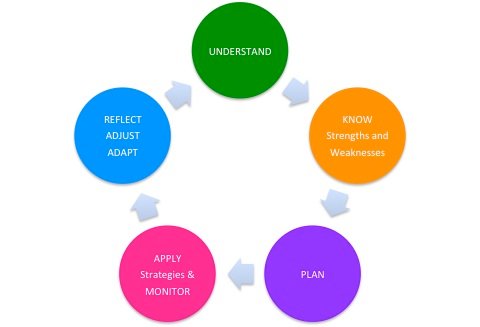
Image Source
Knowledge that a man may have about his or her capacities and about the remarkable learning attributes that influence cognitive handling is what declarative metacognition knowledge is. Learners fluctuate in the nature of their declarative knowledge relying upon an assortment of variables including age and capacity.
Flavell recognized sorts of declarative knowledge along the dimensions of knowledge of individual, undertaking, and system.
Dimensions of Declarative Knowledge
- Procedural metacognitive knowledge
- Conditional metacognitive knowledge
Procedural metacognitive knowledge alludes to knowledge of how to execute procedures, for example, learning systems. The procedural knowledge of talented learners is more programmed, exact, and viable than that of incompetent learners.
Conditional metacognitive knowledge alludes to knowledge about when and for what reason to utilize procedures or methodologies. The conditional knowledge of fruitful learners makes them extremely effortless and adaptable in their technique utilize.

Image Source
Metacognitive control, in some cases likewise alluded to as executive control, is portrayed in different routes by various researchers, however the closeness among the definitions is genuinely apparent. Jacobs and Paris divided metacognitive control into the procedures of planning, assessment, and direction. Planning incorporates the choice of a technique to accomplish an objective.
Assessment is monitoring of the advance made toward accomplishing the objective. Control alludes to the amendment or adjustment of the techniques to accomplish the objective.
Executive control comprises of:
- Monitoring
- Regulating
Monitoring incorporates distinguishing the undertaking, checking the advance of assignment fulfillment, and foreseeing the possible result.
Regulation incorporates assignment of assets, determining the number of ventures to finish an undertaking, and the force and speed with which it will be finished.
Paris and Lindauer portrayed metacognitive control amid reading and writing as comprising of planning, monitoring, and assessment. In this case, planning alludes to the choice of methodologies and the assignment of assets, monitoring to understanding monitoring, and assessment to the examination of advance toward objectives that can lead back to all the more planning and all the more monitoring.

Image Source
What is regular to these enunciations of the control procedure is some underlying investigation of what to do, making an arrangement to accomplish something, assessing the helpfulness of that arrangement, and after that making proper amendments or adjustments to the first arrangement. Accumulate depicted limits between research on metacognition and research on executive control.
These territories of research have created from various hypothetical introductions, make different suppositions, and depend on assorted methodological tools. A significant part of the work on metacognition rose up out of Piagetian developmental research, while research on executive control started in the data handling model.
Researchers from the two conventions vary in the accentuation put on metacognitive knowledge instead of metacognitive control. There are elective points of view on metacognition. For instance, Schraw and Moshman concentrated without anyone else cognition and on how all around built up these knowledge structures are.
These speculations are systematic structures used to clarify and coordinate cognition, metacognitive knowledge, and regulatory abilities. Schraw and Moshman recognized implicit, informal, and formal metacognitive speculations. Unsaid speculations are verifiable, procured or built with no express mindfulness.

Image Source
Since learners don't know about them, these understood structures are not open for confirmation and may hold on notwithstanding when wrong or maladaptive. Informal hypotheses are fragmentary. Learners know about some of their convictions and suspicions however have not yet developed an unequivocal hypothetical structure that coordinates and legitimizes these convictions.
Not at all like unsaid theorists, in any case, informal theorists do have some level of express metacognition and along these lines can judge the estimation of their structure. Formal speculations are profoundly systematized accounts of marvel including express hypothetical structures. As per Schraw and Moshman, the good methodology user as plot by Pressley, Borkowski, and Schneider would be a case of a formal metacognitive hypothesis.
Formal theorists are unequivocally mindful of their deliberate endeavors to build and adjust metacognitive hypotheses, so they can utilize formal hypothesis to evaluate and decipher perceptions. Schraw and Moshman proposed that learners create metacognitive speculations through social learning, singular construction, and companion connection.
Cornoldi reverberated the point of view of Schraw and Moshman in his meaning of metacognitive demeanor as the general propensity of a man to create reflection about the nature of his or her own particular cognitive capacity and to consider the likelihood of expanding and utilizing this reflection.

Image Source
References:
Metacognition Flavell
Metacognitive Theories
Metacognitive Strategies
Metacognition: A Literature Review
WARNING! The comment below by @angela-noel leads to a known phishing site that could steal your account.
Do not open links from users you do not trust. Do not provide your private keys to any third party websites.
Downvoting a post can decrease pending rewards and make it less visible. Common reasons:
Submit
Thanks for sharing this photography is very nice psychology post
Downvoting a post can decrease pending rewards and make it less visible. Common reasons:
Submit